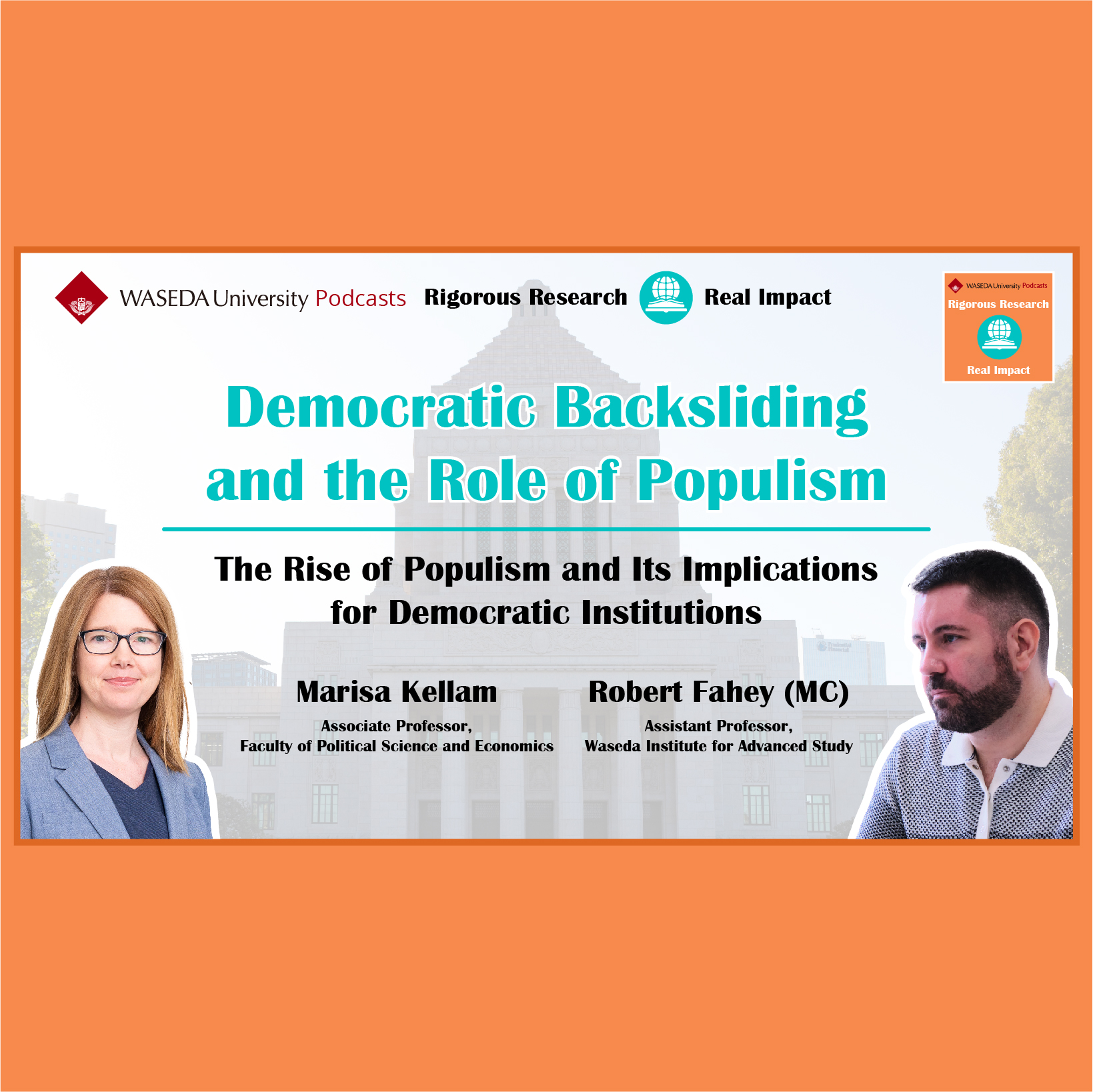[Podcast Column] Populist Leaders’ Effect on Democratic Backsliding
Wed, May 14, 2025-
Tags
The first 8-episode series of Waseda University’s English podcast “Rigorous Research, Real Impact” is currently streaming for free on Spotify, Amazon Music, Apple Podcasts, and YouTube.
Episode three features guest Associate Professor Marisa Kellam (Faculty of Political Science and Economics) speaking with MC Dr. Robert Fahey. This podcast column showcases an excerpt from their conversation, which was centered around the connection between populism and democratic backsliding, the topic of Professor Kellam’s 2023 article “Who’s to Blame for Democratic Backsliding: Populists, Presidents, or Dominant Executives?”
 You can read the full transcript by clicking the above episode banner.
You can read the full transcript by clicking the above episode banner.
Question: You co-authored the article “Who’s to Blame for Democratic Backsliding: Populists, Presidents, or Dominant Executives?” with your former PhD student Antonio Berlucchi. Can you share how the project came about and what you concluded?
Professor Kellam:
This project actually began from discussions in my seminar at the Graduate School of Political Science here at Waseda. And although my research is focused on Latin America, my graduate seminar includes students from various regions around the world who are interested in politics all around the world. So, a master’s student from Mongolia was noticing the rise of populism in his country, as well as the very disproportionate election outcomes where one party was winning most of the seats in Parliament. Another graduate student from Italy was noticing the rise of new challenger parties in Europe. And the question that rose up for all of us was whether it was the nature of political institutions and the party system, or whether it was ideology and particularly populism that was driving the democratic backsliding trends around the world.
And we also noted in Japan that some observers here were pointing to democratic backsliding, and we wondered whether this might be due to the dominance of the LDP. And I ended up writing this paper with Antonio Berlucchi, who was a PhD student at that time. And in part of this graduate seminar, we set up this analysis sort of as a test. What causes the most backsliding? Is it populism? Is it presidents, as in Latin America and the US rather than prime ministers? Or is it the dominance of large super majorities that don’t have any real checks or constraints on their power? And I guess we kind of already knew that populism was in tension with liberal democracy. Existing research had made these arguments, but scholars had only focused on cases where democratic backsliding was happening.
And we wanted to look at all populist leaders and compare them to non-populist leaders, governing in similar conditions and see if populist leaders were in fact more likely to engage in democratic backsliding, and if so, by how much more. But I was actually rooting for a different hypothesis. My hunch was that supermajorities were dangerous, particularly dangerous for democracy. And of course, supermajorities can be produced by the democratic process in free and fair elections. They can also, of course, be manufactured by tweaking the electoral rules. But I thought that democracy would decline more where presidents or prime ministers were backed by supermajorities.
Viktor Orban in Hungary, Chavez in Venezuela, Evo Morales in Bolivia, they were all leaders who commanded supermajorities, but so did Abe in Japan. So, we wanted to see what the effect is. Can we disentangle populists and supermajorities? In the end, we find some support for this hypothesis. But our strongest, most robust finding is that more democratic backsliding occurs when populists are in power.
About the Guest:

Associate Professor Marisa Kellam
Dr. Marisa Kellam is an associate professor at Waseda University, where she researches the quality of democracy in Latin America. Her research links institutional analysis to various governance outcomes in democracies within three lines of inquiry: political parties and coalitional politics; mass electoral behavior and party system change; and democratic accountability and media freedom.
After earning a Ph.D. in Political Science from the University of California in Los Angeles (UCLA), Dr. Kellam spent several years as an assistant professor at Texas A&M University. Since moving to Tokyo in 2013, she teaches international and Japanese students in the English-based degree program of Waseda University’s School of Political Science & Economics. During her 2021-2023 sabbatical, she was a visiting scholar at the Center on Democracy, Development and the Rule of Law at Stanford University.


![[Podcast Column] Populist Leaders’ Effect on Democratic Backsliding](https://www.waseda.jp/top/en/assets/uploads/2025/05/Pod-Column-3-Full-quality.png)











